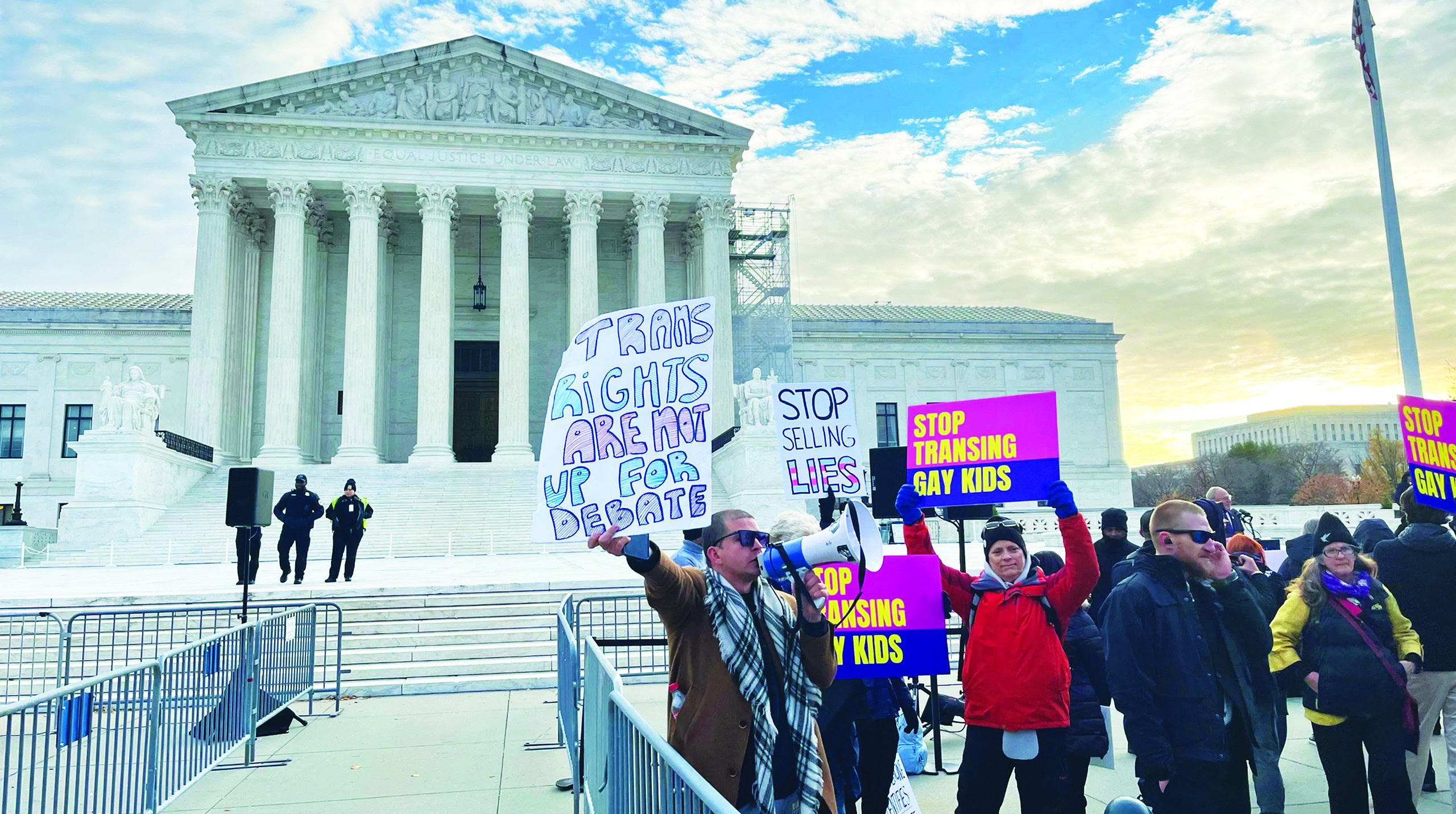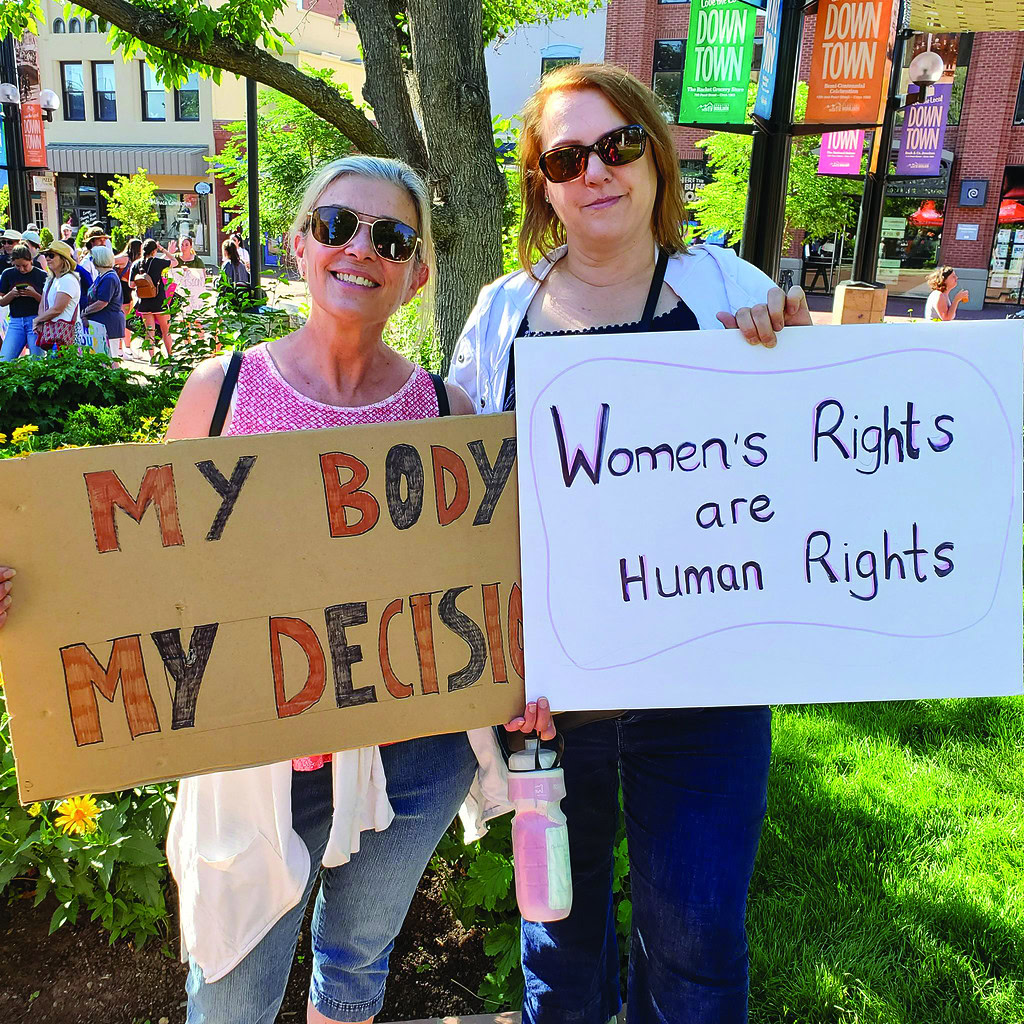
This is Part 2 of a two-part series. The first installment, published Jan. 9, explored immigration and tariffs.
On Jan. 20, Donald Trump will become the 47th president of the United States, beginning his second term. While Trump disconnected himself from Project 2025, policy-writers for the document include confidants and administrators from the first administration. Much of the document proposes restrictions to access of life-saving abortions, prosecution of care-providers who administer abortions and restrictions of contraceptives.
Coupled with the incoming administration’s stance on bodily autonomy is their discriminatory policies against transgender people. Trump has pledged to end “boys in girls’ sports” and revoke Title IX extensions to trans students. In the final days leading up to the election, ads vying for the now president-elect remarked, “Kamala is for they/them. Trump is for you.”
Experts and political commentators have been suggesting that Trump’s second term will be more intentional in its targeting of vulnerable communities than his first. Nonetheless, Boulder-area advocacy groups and elected officials are hopeful state and local protections will keep them safe.
LGBTQ rights and healthcare
In early January, a federal judge stripped Title IX protections from transgender students. That in and of itself does not change Colorado’s laws prohibiting gender-based discrimination, said Anaya Robinson, senior policy strategist with the ACLU of Colorado.
“Whether it be K-12 or the university level, public schools are public accommodations, and they cannot thus discriminate on the basis of gender identity or gender expression within the state of Colorado,” Robinson said. “That’s subject to superseding federal law that may come down obviously, but the removal of that interpretation in Title IX does not immediately remove that protection under Colorado state law.”
Robinson said federal policy could undo Colorado’s Anti-Discrimination Act — which bans public accommodations like schools from discriminating against students based on identifiers like gender identity, sexual orientation and race — but protections will likely last through the early portion of Trump’s term.
Though not explicitly included in Trump’s policy proposals, the former president has threatened to cut federal funding for schools that teach “radical gender ideology.” That could impact schools in the Boulder Valley School District; the district has a privacy policy protecting a student’s gender-nonconforming status.
BVSD receives six funding streams coming from the Every Student Succeeds Act (ESSA), helping fund specialized education for at-risk students, training for teachers and expanded use of technology in the classroom.
“When you cut the program, the need is still there. You still have to spend the money,” said Dr. Rob Anderson, Superintendent of Boulder Valley School District. “Some [proposed] cuts would be program specific, and others might impact other funding sources just because we have needs that we have to meet.”
Anderson said the district is planning to lean on outside organizations such as Impact on Education, a foundation supplementing funding needs for K-12 schools.
Robinson said the ACLU of Colorado’s mission is to expand current protections, matching areas of vulnerability with state-level inclusive policy. Groups like Boulder-based A Queer Endeavor are working to fold LGBTQ histories into K-12 curriculums; they have working relationships with seven school districts in the state.
“In our state, school boards have a lot of local control,” said Sara Staley, A Queer Endeavor’s co-director and an associate professor at CU Boulder’s School of Education. “That’s where things get tricky, because parents show up to school board meetings, and it’s usually parents who are critical against any kind of DEI at the district or school level.”
While protections exist in the classroom, organizations like You Can Play are working to ensure LGBTQ students are treated equally in the gymnasium by educating schools and sports leagues nationwide on how to include genderqueer identities in sports.
Trump claims that trans competition in sports is widespread. Kurt Weaver, You Can Play’s chief operations officer, says there is little data to suggest that cis high school athletes differ significantly from their trans competitors.
“There’s real problems in sports for gender equality and opportunity for women; one of them is not a trans athlete participating,” Weaver said. “At the collegiate level, 70% of colleges are out of compliance with Title IX.”

In the wake of such policies and anti-trans rhetoric from the Trump administration, Rocky Mountain Equality (RMEQ, formerly OUT Boulder County) is keeping a wary eye on federal funding and policy changes for healthcare, said Bruce Parker, chief operating officer of the Boulder-based nonprofit.
Colorado is among 16 states that have state legislation protecting a trans person’s access to healthcare. Parker said that while state and local protections do exist, federal control over policy can imminently disrupt current trans access to care.
“You don’t even have to undo state level stuff to make life awful for people,” he said. “All you have to do is pass a rule that says that anybody who doesn’t have a male or female gender marker on their identification can’t access federal benefits, and suddenly, thousands of people in Colorado who’ve adopted the X marker can’t access their federal benefits” — namely Medicare or Medicaid coverage.
Parker said local groups will be largely dependent on donations to survive and continue their work.
“Usually in this context, when government funding goes down, our individual donations and foundation donations go up,” he said. “It’s like a balancing act there.”
Parker is still hopeful that government money will be available, noting how crucial it has been for programs like vaccine distribution and education.
“We’ve had a lot of success the last three years in getting state and federal money to provide the behavioral healthcare services that we provide,” said Parker. “I would take a million dollars from Elon Musk today, and I would use it to help LGBT people.
“I would not trade a single value or do a single thing differently because it was from him.”
Reproductive freedom
This past election day came with the most recent, local victory for reproductive freedom: Amendment 79, which enshrined the right to abortion in the Colorado constitution.
Among groups leading the push for Amendment 79 was YWCA Boulder. Debbie Pope, YWCA’s chief executive officer, said one of the main focuses considering an incoming Trump administration is checking back in to make sure Amendment 79 is being upheld by the state law.
“In Boulder County, we mobilized thousands of individuals to not only vote for [Amendment 79], but also, in the early phases, getting signatures for that,” Pope said. “Our next step is working with larger coalitions across the state now to ensure that what the voters voted for will indeed be put into the constitution.”

Through Trump’s campaign trail, he made clear he doesn’t support utilizing the Comstock Act — which would make the shipment of medications and instruments assisting abortions across state lines illegal — and wants to leave abortion up to states. However, advocates like Pope have a reason to be wary, as Trump has floated the idea of banning abortion for pregnancies beyond 15 weeks. In addition to campaign rhetoric about a national ban, the president-elect takes credit for “killing Roe v. Wade.”
Federal funding for pro-choice groups like YWCA may also be disrupted, Pope said. And there is still work to be done in Colorado on other gender-based issues, such as access to healthcare and childcare.
Despite the legal protections in place for abortion, anti-abortion groups are still present, spreading misinformation and complicating access to care.
“New Era did a large listening tour across Colorado in 2021, and from there, we learned that young people were being targeted by anti-abortion counseling centers,” said Natasha Berwick, political director at New Era Colorado. Organizations like New Era, Berwick said, are acting on targeted areas of vulnerability that would lead to inequitable reproductive care.
“What we know is that not everybody has equal access to abortion or reproductive health care. … We have serious concerns about BIPOC folks who already have a hard time accessing abortion and reproductive health care, and this exacerbates that.”
